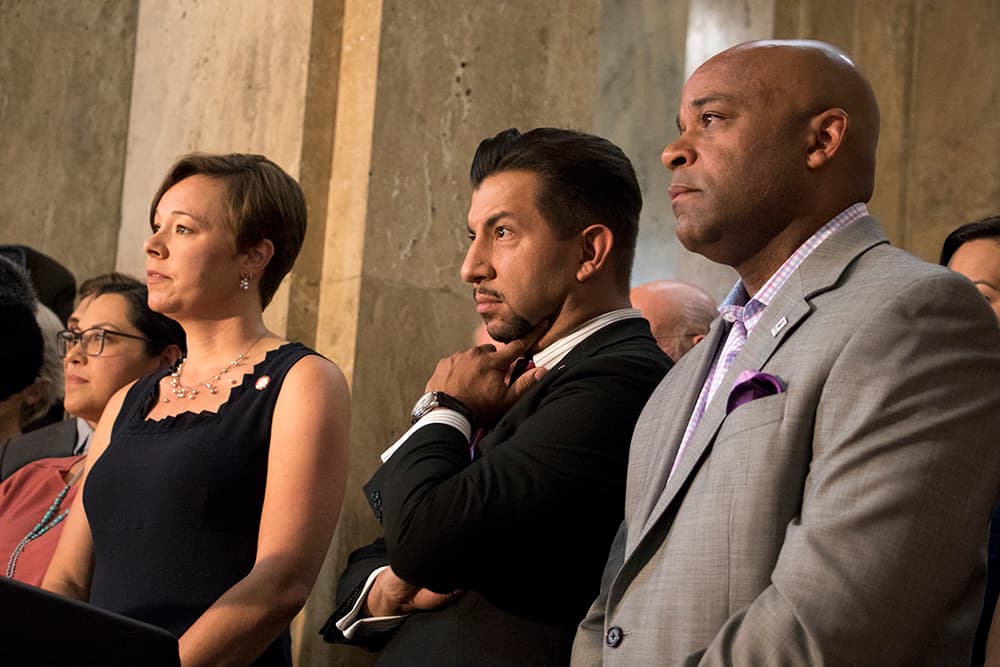
Mayor Michael Hancock, Denver City Council members and immigrant advocates have united behind a new version of an ordinance that would give force of law to existing city policies that limit cooperation with federal immigration authorities.
The bill retains the ability of the Denver Sheriff's Department to notify Immigration and Customs Enforcement when certain inmates are released from the Denver jail -- a point of contention between Hancock and council members Robin Kniech and Paul López in an earlier version of the bill -- but it adds in requirements to also notify those immigrant inmates that ICE wants to talk to them and advise them of their rights.
Hancock and City Council members described the actions of the Trump administration as a crucible that have forced them to examine and refine their values and turn them into action. This ordinance reflects that.
"The White House right from the start sought to bully us into turning against certain residents of our community," Hancock said. "The wave of fear that has been caused by this administration is unconscionable."
Hancock said the message to Denver's refugee and immigrant community is: "We've got your backs."
López described the impact that fear is already having on the immigrant community. Some parents are keeping children home from school and making separation plans. In the first several months of this year, Denver saw a 12 percent drop in crime reporting from Latinos, while crime reports were up slightly among other groups. This trend was first identified by the statistics-oriented news site FiveThirtyEight.
"We must continue to keep Denver safe," he said. "People are afraid. We need to be able to report crimes, no matter who you are or what your last name is or where you come from or where you live. We need to be able to pay parking tickets. We need to be able to come and sit in City Council meetings. We need to clarify what the law is."
The Department of Justice has threatened to withhold grant funding from cities and counties that don't notify ICE of the pending release of inmates wanted for immigration violations and that don't share other information. Kniech noted that so far, there has been no formal guidance or rule change, just press conferences.
"Those have about as much legal authority as a tweet," she said.
Nonetheless, maintaining notifications for pending releases means Denver is closer to what the DOJ wants than it would be under the previous Kniech-López proposal.
Kniech emphasized that Denver remains in compliance with federal law.
"There is one federal statute out there," she said. "We comply with it today. We will comply with it after this bill passes. This bill follows the law, but to do more than the law is not our obligation."
The key provisions of this ordinance are:
- Denver will not honor immigration detainer requests to hold immigrants who would otherwise be released from jail so that immigration agents can pick them up. Denver will only respond to a judicial warrant -- one signed by a judge. This reflects existing policy and the city's understanding of the Fourth Amendment.
- Denver employees will not ask for or collect information on people's citizenship or immigration status, except as required by federal or state law. This is already prevailing city policy.
- Denver will not share any information for the purposes of enforcing immigration law. Fingerprints of people booked into the jail will still go to the FBI and the Department of Homeland Security, as required by federal law, and sheriff's deputies will inform ICE when certain immigrants are due to be released from jail.
- Denver will not use city resources to assist immigration enforcement, including prohibiting ICE agents from entering secure areas of the jail. That last practice is a change from current policies.
The ordinance applies to all city employees, including probation officers and pre-trial services staff in the Denver County Courts.
Making this an ordinance means that employees who violate these rules face stiffer penalties than they would for violating a predominant practice.
López said the city is already doing a lot of the right things, but immigrant communities don't know it and are afraid. Making this the law would send a strong message and help get the word out.
Hancock plans to issue an executive order that implements training for employees in the new policies and creates a legal defense fund for immigrants, as well as assistance for families in which parents and children are separated by detention or deportation. Hancock said he's primarily looking to pay for those programs with private donations, but some public money might be used.

The unified front presented by city officials -- who held a press conference Wednesday flanked by immigrant advocates -- represented a step forward from a few weeks ago, when Hancock was considering an executive order that seemed to conflict with a proposed ordinance from Kniech and López.
Julie Gonzales, policy director for the Meyer Law Office, said she was initially taken aback by Hancock issuing his own proposal that did not align with changes advocates wanted to see. The issue of notifications was important to advocates.
"That was a hard piece for us to lose, and yet being able to put in some wrap-around constitutional rights advisement, to tell people you have a right to remain silent and you don't have to participate in this interview, that's important," she said.
"It's important to stand here in the city of Denver and say we have drawn a line."
Hancock said ending notifications to ICE entirely could "create a gap in community safety."
"The other thing is that, as challenging as it is, we have to maintain some effective communication with the ICE agency," he said. "We needed to preserve that going forward so we maintain the safety system, including for our immigrants and refugees."
The ordinance calls for the city to track for whom ICE requests notification and what types of crimes they stand accused of, as well as what happens to immigrant inmates after release. López said that data will help guide policy going forward. Denver's position might be different if ICE is picking up lots of low-level traffic offenders or if it primarily requests information on repeat offenders and violent criminals.
The Denver Sheriff's Department came in for heavy criticism after a man wanted by ICE was released from the jail and later charged in a murder. Deputies in that case did notify ICE of his pending release, but the notice went out late at night with very short notice. More recently, a man accused of killing another inmate -- but not charged in the incident because it could reasonably be considered self-defense -- was released from the jail, despite ICE wanting him for potential immigration violations.
Though Denver officials believe they remain compliant with the law, Hancock said he understands federal law enforcement grants might be at risk.
"We will not be bullied and we will not be blackmailed," he said. "We lean on our values. The reality is we may lose funding. We understood that going forward. We are going to stand by our values because when this administration is over, that's what we'll be left with, our values."
Next steps:
Denver City Council holds an initial vote on Monday, Aug. 21. There will be a public hearing and second vote Aug. 28.











